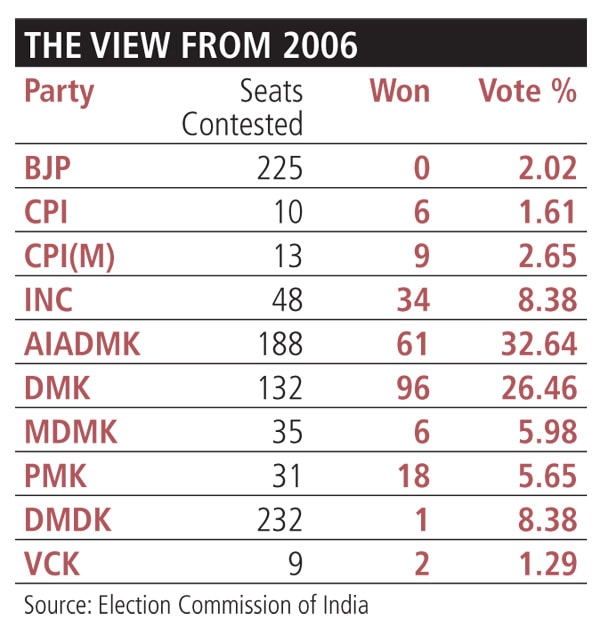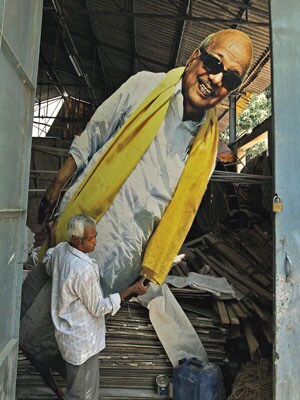
Tamil Nadu Elections: Kalaignar 's Swan Song?
Neither age nor the Tamil Nadu voter is ready to show any kindness to the old warhorse whose seven-decade long political career is in its late stages
Those who stray from the moral path will have neither peace in success not fortitude in tribulation; their pain is like that of the palanquin-carrier who cannot put his burden away
–M. Karunanidhi in Kuraloviyam, a commentary on Thirukkural
Those with even a passing knowledge of Tamil Nadu politics know that it is an accepted practice there to bribe voters with hard cash to persuade them to vote in a particular way. Things came to such a pass in recent bye-elections that some voters even auctioned their suffrage to the highest bidder. The current inflation-adjusted rate is about Rs. 6,000 per smudged finger in a Legislative Assembly election.
So it is reasonable to surmise that as election fever grips the state, political workers crisscrossing the 234 constituencies should be carrying stashes of cash. Indeed, the election commission and the income tax department thought so too; their flying squads checked passing cars and raided the houses of political workers. And what a rich haul they made! Within a week, they seized Rs.20 crore in unaccounted money. Naturally, no party claimed ownership or asked for the cash back.
That’s a pittance in the state that gave the nation its largest ever corruption scandal, worth Rs. 176,000 crore.
The cash-for-vote culture is just a footnote in the orgy of scandals that the ruling party Dravida Munnetra Kazhagam (DMK) has spearheaded in the last few years. Neither the party nor its leader, Muthuvel Karunanidhi, is a stranger to corruption charges. As early as 35 years ago, a panel called Sarkaria Commission described DMK as the masters of ‘scientific corruption’, the variety that leaves no trace.
That description is being recalled now as DMK fights to return to power in the state in the wake of the 2G Spectrum scam and widespread charges that Karunanidhi’s family and relatives control virtually everything from the grant of government contracts to real estate deals to private business. “The first and foremost issue among voters today is not just the corruption but how the civil society has been betrayed and one family has gathered such clout and power,” says Professor Ramu Manivannan, who teaches political science at the University of Madras.
There is no doubt that a strong anti-incumbency wave is sweeping over Tamil Nadu. The DMK was the first to admit this, albeit tacitly. Karunanidhi kept quiet when the Centre began investigating the 2G scam and got the tainted ex-telecom minister, A. Raja, arrested. At a party meeting, when angry leaders spoke in favour of snapping ties with the Congress, Karunanidhi silenced them. He said no such possibility should even be considered. He also succumbed to Congress pressure in the seat-sharing talks, giving his ally both the number and choice of seats.
A Time for Change
A Forbes India correspondent who travelled across Tamil Nadu reports that the anger against corruption is more pronounced in urban areas while soaring prices of food and essential commodities are the prime concern in villages. Tamilarasi, 25, a mother of two and a farm worker in Alagarkovil near Madurai, says everything from food prices to bus fare has gone up in the last three or four years. “I spend much more to feed my younger son than I spent on my elder one when he was that age,” she says. Her family can no longer afford the usual excursions to Madurai city. Devadoss, a cab driver in Chennai, feels the same pinch too: “Amma (AIADMK supremo Jayalalithaa) would have done something. Kalaignar (Karunanidhi) doesn’t care.”
But then, an anti-incumbency mood is the default state of mind among Tamil Nadu voters. The last time they returned a ruling party to power was 27 years ago. They also don’t vote in half measures. From Chennai to Kanyakumari, from Ooty to Nagapattinam, they speak in one voice. This makes the Opposition party’s task very simple: Just keep quiet and win. In fact, that’s what AIADMK plans to do, senior party leader C. Ponnaian, says. “We don’t even need any specific strategy for this election. The public has already made up its mind to vote against Karunanidhi for his anti-people activities. We just have to harvest the wave.”
Karunanidhi has spared no expense — be it the party’s money or the government’s — to reduce the intensity of this wave. Tamil Nadu has a well-entrenched culture of freebies. From sarees to wedding jewelry to plots of land to colour television sets, the government just keeps giving and the people just keep taking. Karunanidhi took the practice one notch higher by distributing colour TVs to even affluent families. Never mind that his second wife and daughter run a TV channel and his grand-nephews own South India’s largest broadcast network.
Karunanidhi has faced such desperation only on two occasions since he first became chief minister 42 years ago. In 1984, he got posters pasted across the state, showing him in a friendly chat with the then chief minister, M.G. Ramachandran (MGR), whom he was hoping to defeat at the hustings. The idea was that public would be less hostile to him if their star-hero MGR were shown to be a friend of his.
The next time was in 1991 after the assassination of Rajiv Gandhi. People blamed the DMK regime in 1989-1991 for allowing the Liberation Tigers of Tamil Eelam to build up its network in the state and run guns. In the ensuing elections, his party was routed.
A New Era in State Politics
The 2011 Assembly elections are a major turning point in the political history of Tamil Nadu for at least four reasons.
Tamil Nadu is best known as the hotbed of the Dravidian movement, the non-Hindi, anti-Congress movement in Tamil Nadu that started in 1925 fighting issues like untouchability. The DMK, a part of that movement, took to the political platform to achieve its aims. But in time, it got sucked up in the web of cutthroat politics, dropping its agenda one by one. Also, the early leaders of the movement are long gone, leaving behind a lone General in the form of ‘Kalaignar’ Karunanidhi.

‘Kalaignar’, a prolific writer and a fighter with enormous staying power, is getting old. He is 86 and wheelchair-bound. It is an open secret that the government is run by his son, M.K. Stalin (born the same week as Russian leader Joseph Stalin died). Karunanidhi may not be able to ignore old age much longer. In the next elections in 2016, he would be 91, and too old for the bloody games of politics he once reveled in.
So, the current elections may well be the last for the classical Dravidian movement. A number of parties have prefixed ‘Dravida’ to their name but there is no one in those parties who can claim that legacy. Cinema is the only political ideology now in the state, ruled by film icons for the past 42 years.
The polls will also mark a generational change in Tamil Nadu politics after 22 years. It was in 1989 that Jayalalithaa led a faction of the AIADMK for the first time into the polls. Karunanidhi, who had fought against the likes of Kamaraj, Rajaji and MGR, is still reeling under the impact of her charisma.
Today, his own sons — Stalin and M.K. Azhagiri — are ready to replace him. The Congress party is increasingly leaning towards new leaders like G.K. Vasan and Karthi Chidambaram. Actor Vijaykanth has become a force to reckon with. These are the people that Jayalalithaa will henceforth worry about, not the old warhorse.
With so many leaders, votes are getting fragmented. The state’s vote bank first moved beyond the three giants—DMK, AIADMK and the Congress—in 1991 when PMK fought on a casteist agenda. More parties cropped up after that. All of them had to align with either DMK or AIADMK to survive, but that also meant the two giants had to part with more constituencies.
This time, the DMK is contesting in only 121 seats, just three more than the half-way mark. The AIADMK, too, has a number of smaller parties in its alliance and has been locked in a battle of nerves with them over seat-sharing. In other words, the two major parties will have to consider alliance partners in power equations. This could well be the dawn of coalition era in the state.
The fourth factor that makes this Assembly election so interesting to watch is the shrewd way in which the Congress Party is trying to reinvent itself in Tamil Nadu. It is fully exploiting the misfortune of DMK, forcing it to give away 63 seats, 15 more than the 2006 elections, and has cornered some juicy constituencies. Over the years, the vote share of Congress has fallen from 20 percent to just 8 percent. This is its best chance to reverse the trend.
Should the alliance scrape through, the Congress will dictate to DMK on government formation. But for now, the biggest worry for both parties is to get their hostile cadres to work together and put up a bloody good fight.
(This story appears in the 30 November, -0001 issue of Forbes India. To visit our Archives, click here.)






